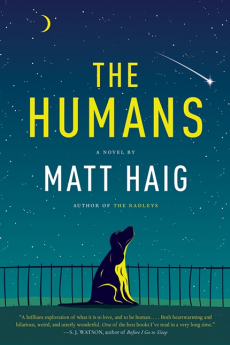
On his website, Matt Haig writes “This is the book I am most proud of. I have never written anything like it and probably never will again. I have no idea if you will like it. I really hope you do.” It is easy to see why he is so proud of this work. It is an astonishingly deep analysis of the human race which examines why we do what we do in only 291 pages. The book delves into the areas of scientific progress, family relationships, societal norms, vegetarianism and mortality, to name a few.
The novel opens with Professor Andrew Martin, a Cambridge mathematician who has just made the discovery that will advance the human race to the level of the aliens with which we share the universe – except, the aliens have decide we are not ready for such a discovery yet, what with our predisposition to violence and self-destruction. So Andrew has been replaced by an alien whose job it is to destroy all evidence of this discovery. Despite how it sounds, this is not your typical alien story. The focus throughout the book is not on understanding the aliens, it is on understanding the humans. We are a complicated species. We have rules that we follow for no particular reason, and a vast amount of clothing customs that baffle the Vonnadorians of the narrator’s home planet. The book follows our main character as he attempts to navigate this strange world with satirical humour. It is a testament to Haig that this book is so insightful – I have never read something that has so captured the wonder and confusion that would arise, should someone outside the human race meet a member of our species for the first time. Haig questions every aspect of our world in what must have been as absorbing a novel to write as it is to read.
As a maths student, I particularly enjoyed the quips on mathematics and those studying and working in the field. A favourite line of mine is “It was not exactly difficult to make human students of mathematics laugh. Indeed, I had never met a sub-category of life form so desperate to laugh”. The Vonnadorians believe that mathematics is above all other things – that other subjects like history are simply sub-categories of maths and that the news should start with mathematics and work downwards. The problem that Professor Andrew Martin is said to have solved is proving the Riemann Hypothesis – one of the Millennium Prize problems. The hypothesis is another step on the way to showing how many primes exist below a certain number. As an undergraduate, the details of this hypothesis are above my level of understanding, but it was nonetheless exciting to see my subject featuring in pop culture.
The book manages to write its own conclusion in one of the final chapters, titled ‘advice for a human’. It contains a ninety seven point list with such insights as “Dogs are geniuses of loyalty. And that is a good kind of genius to have.” And “School is a joke. But go along with it, because you are very near to the punch line.” It is this summing up of humanity that is thematic throughout the book – Haig seems to write about Earth from the outside looking in, which is a difficult thing to do and an enthralling thing to read.
Image credit: http://www.hotkeyblog.com/wp-content/uploads/2014/07/the-humans.jpg

0 Comment:
Be the first one to comment on this article.